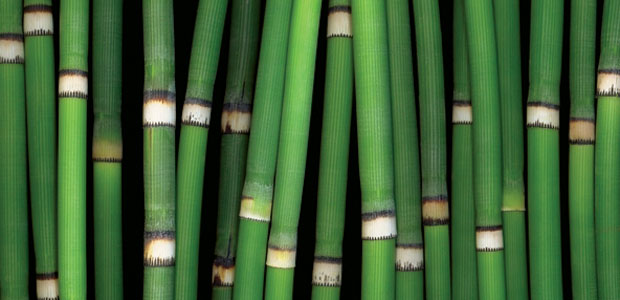Advertisement
Prehistoric Horsetail and Modern Healing
Horsetail (Equisetum arvense) is a direct descendant of the giant fern-like plants that covered the Earth some 200 million years ago. Today a much smaller version of this prehistoric perennial, resembling asparagus, can be found growing in moist or sandy soil along shady steams and creeks in early spring. The hollow stems and shoots of … Continued

Horsetail (Equisetum arvense) is a direct descendant of the giant fern-like plants that covered the Earth some 200 million years ago. Today a much smaller version of this prehistoric perennial, resembling asparagus, can be found growing in moist or sandy soil along shady steams and creeks in early spring.
The hollow stems and shoots of horsetail are a rich source of naturally occurring calcium, magnesium, potassium, and other valuable nutrients, including silica crystals. Many of the medicinal properties of horsetail can be attributed to its high silica content, which is easily absorbed by the body.
Silica is an essential trace mineral that plays an important role in the development, strengthening, and maintenance of healthy bones and teeth. Silica also restores weak connective tissues in blood vessels, cartilage, tendons, and in collagen–the body glue that helps hold our skin and muscle tissues together. Silica speeds the healing of bone fractures, is said to help rheumatism and arthritis by improving the elasticity of the joints, and is recommended to athletes for sprains, pulled hamstrings, and torn ligaments.
Silica and Science
Silica helps maintain bone density and strength by facilitating the absorption of calcium and other minerals into bone tissue. In a 1993 study published in Magnesium Research, silica was shown to increase bone density of the femur (the bone from the hip to the knee), making it a good choice for the prevention of osteoporosis. Research conducted in the 1980s in France and the US demonstrated that bone fractures healed better when there was an abundance of silica present along with calcium in the body.
Silica may also help reduce the formation of plaque in the arteries and reduce the body’s absorption of aluminum, protecting the brain from aluminum toxicity that has been associated with Alzheimer’s disease.
Astringent Action
Another noteworthy use of horsetail is to improve the tone and elasticity of our skin, and it is often included in anti-aging skin care products. In addition, the silica content of horsetail can revitalize dull, limp hair and stimulate hair growth, making it thicker and shinier. It also strengthens nails so they are less prone to splitting and breaking and helps harden tooth enamel.
Horsetail also has an affinity for the urinary and reproductive systems. It acts as a mild diuretic to soothe and heal cystitis and other minor urinary tract infections, especially when accompanied by bladder irritation and blood in the urine. It is considered useful in reducing edema and water retention associated with menopause and in cases of inflammation or benign enlargement of the prostate gland.
Horsetail’s excellent astringent and toning action helps decrease or stop passive bleeding and is used to slow heavy menstruation. Its astringency also makes it effective in the treatment of bed-wetting in children and incontinence in adults.
Horsetail can be used externally to shrink and tighten the top layers of skin and mucus membranes to reduce secretions and relieve irritation. When applied topically, horsetail helps alleviate the discomfort of hemorrhoids, especially those that bleed. Horsetail also works well for cuts and scrapes, first-degree burns, nose bleeds, inflamed and bleeding gums, and difficult-to-heal skin conditions such as eczema and acne.
The herb has been well tolerated in studies but some people may experience mild stomach upset or minor skin irritation. Horsetail is not recommended for use by pregnant and nursing women, children under two, or by those who have edema that is associated with impaired heart or kidney function. To prevent potassium loss, drink plenty of fluids while taking horsetail, and do not take it in combination with other diuretics.
Several look-alike species of horsetail may cause a thiamine deficiency, so rather than picking the plant, use a commercial supply of Equisetum arvense that has been proven safe.
Steep Some Horsetail Tea
Teas, tinctures, and capsules that have been prepared from spring-picked Equisetum arvense species are available at most natural health stores. While the tincture and capsules work well, many herbalists agree that a strong tea made from the dried plant draws out more of the silica and other beneficial minerals, making it a better option for maintaining healthy bones and teeth. Allow the tea to steep for at least 30 to 40 minutes before drinking. The tea can also be added to soup stocks, used as a mouthwash or gargle, applied as a hair rinse, and added to baths and compresses.




